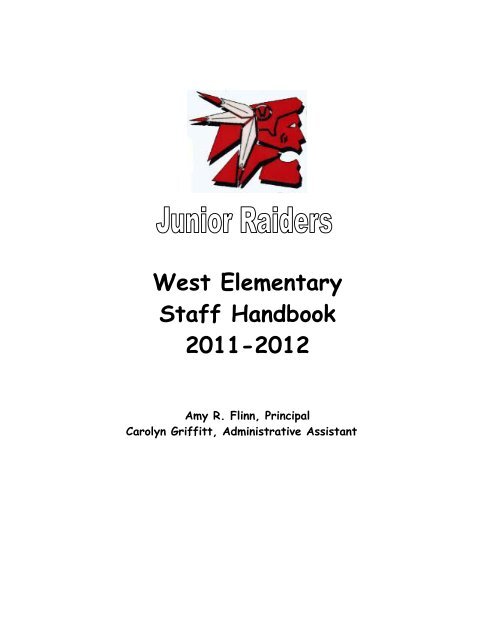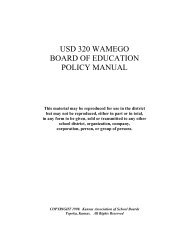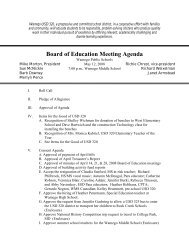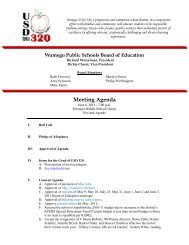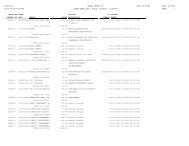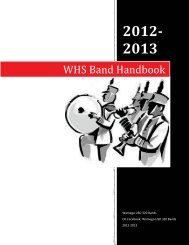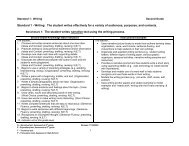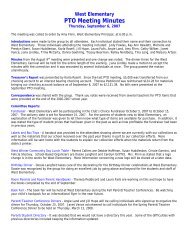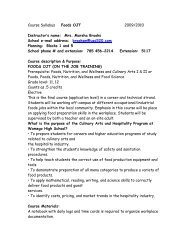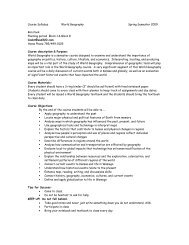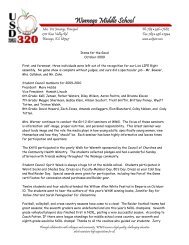West Elementary Staff Handbook 2011-2012 - USD 320
West Elementary Staff Handbook 2011-2012 - USD 320
West Elementary Staff Handbook 2011-2012 - USD 320
You also want an ePaper? Increase the reach of your titles
YUMPU automatically turns print PDFs into web optimized ePapers that Google loves.
<strong>West</strong> <strong>Elementary</strong><br />
<strong>Staff</strong> <strong>Handbook</strong><br />
<strong>2011</strong>-<strong>2012</strong><br />
Amy R. Flinn, Principal<br />
Carolyn Griffitt, Administrative Assistant
Table of Contents<br />
<strong>USD</strong> <strong>320</strong> – Wamego……………………………………1-2<br />
Nondiscrimination<br />
<strong>USD</strong> <strong>320</strong> Mission Statement<br />
District Belief Statements<br />
District Objectives<br />
District Strategies<br />
District Curriculum<br />
School Improvement<br />
<strong>West</strong> Prof. Learning Communities………..2-4<br />
<strong>West</strong> <strong>Elementary</strong> Mission Statement<br />
<strong>West</strong> <strong>Elementary</strong> Vision Statement<br />
<strong>West</strong> Collective Commitments<br />
<strong>West</strong> <strong>Elementary</strong> Goals<br />
<strong>West</strong> <strong>Elementary</strong> Faculty and <strong>Staff</strong><br />
<strong>West</strong> <strong>Elementary</strong> Site Council<br />
<strong>West</strong> Parent/Teacher Organization<br />
Board of Education Members<br />
Important Phone Numbers<br />
<strong>USD</strong> <strong>320</strong> Website<br />
School Day<br />
Daily Schedule<br />
Duty Schedule<br />
Excusing Students from the Classroom<br />
Keeping Students after School<br />
Dismissal<br />
Planning Time and PLC Teaming Time<br />
PLC Faculty Meetings<br />
Professional Development<br />
Teacher Evaluation<br />
The Learning Environment…………………….5-7<br />
Learning Time<br />
Protecting Instructional Time with<br />
Students &Classroom Celebrations<br />
Lesson Plans<br />
Instructional Strategies<br />
Student Assessment<br />
Homework<br />
MTSS<br />
Phonics for Reading<br />
REWARDS<br />
Corrective Reading<br />
Parent Involvement……………………………….7-8<br />
Home-School Compact<br />
Parent Concerns/Complaints<br />
Correspondence<br />
Classroom Websites<br />
School Newsletter<br />
News Releases<br />
Calendar Events<br />
Student/Teacher Support Services..8-9<br />
Student Improvement Team<br />
Confidentiality<br />
Special Services<br />
Title I Services<br />
Counselor/Social Worker<br />
Building Aides<br />
Student Discipline and Management..9-10<br />
Behavior/Conduct<br />
Bullying Prevention Program<br />
Definition of Bullying<br />
Discipline Referrals<br />
FISH Philosophy<br />
Classroom Rules<br />
Building/Office Procedures………………….11-13<br />
Attendance/Lunch Forms<br />
Teacher Leave/Substitutes<br />
Leave Requests and Purchase Requisitions<br />
Fire/Tornado Drills<br />
Crisis Plan<br />
Emergency School Closing<br />
Mail<br />
Email<br />
Copying<br />
Intercom and Announcements<br />
Custodial Requests & Care of the Building<br />
Budget Requests<br />
Collection of Funds/Fundraising<br />
Dress<br />
Cellular Phones<br />
Personal Calls and Personal Cellular Phones<br />
Wellness Committee<br />
Sexual Harassment Policy<br />
<strong>West</strong> Bullying Consequence Matrix………….14
<strong>USD</strong> <strong>320</strong> - Wamego<br />
Nondiscrimination<br />
Discrimination against any student on the basis of race, color, national origin, sex, disability, or religion in the<br />
admission or access to, or treatment in the district’s programs and activities is prohibited. Mr. Doug Conwell,<br />
510 E. Hwy 24, Wamego, KS 66547, 785-456-7643 has been designated to coordinate compliance with<br />
nondiscrimination requirements contained in Title VI of the Civil Rights Act of 1964, Title IX of the Education<br />
Amendments of 1972, Section 504 of the Rehabilitation Act of 1973, and The Americans with Disabilities Act<br />
of 1990. Any student who believes he or she has been discriminated against may file a complaint with the<br />
building principal or the compliance coordinator.<br />
Racial harassment is unlawful discrimination on the basis of race, color or national origin under Titles V1 and<br />
VII of the Civil Rights Act of 1964, and the Kansas Acts Against Discrimination. All Forms of racial<br />
harassment are prohibited at school, on school property, and at all school-sponsored activities, programs or<br />
events. Racial harassment against individuals associated with the school is prohibited, whether or not the<br />
harassment occurs on school grounds. It shall be a violation of this policy for any student, employee or third<br />
party (visitor, vendor, etc.) to racially harass any student, employee or other individual associated with the<br />
school. It shall further be a violation for any employee to discourage a student from filing a complaint or to<br />
fail to investigate or refer for investigation, any complaint lodged under the provisions of this policy.<br />
Refer to JGECA,2,3,4, on file at the school for further information.<br />
Any student complaint of discrimination shall be resolved under the district's discrimination complaint procedure.<br />
<strong>USD</strong> <strong>320</strong> MISSION STATEMENT<br />
Wamego <strong>USD</strong> <strong>320</strong>, a progressive and committed school district, in a cooperative effort with families and<br />
community, will educate students to be responsible, problem solving citizens who will produce quality work in their<br />
individual pursuit of excellence by offering relevant, academically challenging and diverse learning experiences.<br />
District Belief Statements<br />
We believe<br />
• The family is the primary influence on a child’s development.<br />
• A community has a significant supporting role in the growth and development of its members.<br />
• All people are responsible and accountable for their own actions.<br />
• Society is enhanced by the development of its members.<br />
• Change is necessary for growth.<br />
• Excellence is achievable and worth pursuing.<br />
• All people have a capacity to learn.<br />
• Higher expectations promote higher results.<br />
• Learning is a lifelong process.<br />
• Each individual is valuable.<br />
District Objectives<br />
All students will:<br />
• Engage in productive behavior while in school.<br />
• Produce quality work.<br />
• Be self-motivated and goal oriented.<br />
• Master curriculum or their individual achievement programs.<br />
District Strategies<br />
• We will develop a comprehensive curriculum with valid, measurable outcomes and the assessment tools<br />
necessary to accurately measure student progress toward those outcomes.<br />
1
• We will cultivate self-motivation and productive behavior in students.<br />
• We will develop strategies that will require students to create and monitor personal and academic<br />
goals.<br />
• We will develop and support a faculty who accepts the responsibility to challenge and motivate<br />
students.<br />
• We will effectively communicate with students, parents, and community to form strong partnerships.<br />
• We will define the basic characteristics of quality student work, and develop a plan to communicate<br />
those to our community.<br />
District Curriculum<br />
Curriculum for Wamego <strong>USD</strong> <strong>320</strong> is adopted by the Board of Education upon the recommendation of district<br />
curriculum committees. Curriculum at Grades 3-5 includes the areas of communications (reading and language<br />
arts), mathematics, science, social studies, library, art, music, physical education, health and human sexuality and<br />
AIDS education. All curriculum is written with specific outcomes for students. Parents are encouraged to review<br />
the curriculum outcomes, which are available in the principal's office. Specific concerns regarding the curriculum<br />
should be directed to the teacher and principal.<br />
School Improvement<br />
<strong>West</strong> <strong>Elementary</strong> is fully accredited by the Kansas State Board of Education through the Quality Performance<br />
Accreditation (QPA) process. QPA is a school improvement process that holds schools accountable for<br />
continued improvement with respect to student achievement. Parents are encouraged to review <strong>West</strong>’s School<br />
Improvement Plan available in the school office. It is the responsibility of the Site Council to monitor the<br />
School Improvement Plan, the guiding document for QPA that targets the areas of reading, writing, and math.<br />
WEST ELEMENTARY SCHOOL PROFESSIONAL LEARNING COMMUNITIES<br />
The three “big ideas” of a PLC are a focus on learning, collaboration, and a focus on results. Every teacher is a<br />
member of at least one PLC team that will meet regularly to address curriculum, instruction, and assessment<br />
issues with a focus on learning and results. In addition to weekly team meetings, vertical team meetings across<br />
grade levels will also be organized to ensure continuity from building to building and grade level to grade level.<br />
<strong>West</strong> <strong>Elementary</strong> Mission Statement (Why do we exist?)<br />
The mission of <strong>West</strong> <strong>Elementary</strong> School is to assure learning for all through a community of support.<br />
<strong>West</strong> <strong>Elementary</strong> Vision Statement (What do we want to become to accomplish our purpose?)<br />
Our vision is to work collaboratively using a guaranteed, viable, and relevant curriculum to ensure all will be<br />
proficient, well-rounded, and have a thirst for learning in a safe and proactive environment.<br />
<strong>West</strong> <strong>Elementary</strong> Collective Commitments (How will we behave to create the school that will achieve our<br />
vision?)<br />
• We will provide a safe, inviting atmosphere for all.<br />
• We will keep our students’ needs and learning first.<br />
• We will collaborate using agreed upon norms.<br />
• We will work with the community to achieve our school’s mission.<br />
• We will create and implement a curriculum that focuses on best practice and research-based<br />
strategies.<br />
• We will set S.M.A.R.T. goals and use data to guide educational decision-making.<br />
2
<strong>West</strong> <strong>Elementary</strong> Goals<br />
Each PLC team will create their own S.M.A.R.T. goals (specific, measurable, attainable, realistic, and timely).<br />
Teams will present their S.M.A.R.T. goals to the faculty each year and will report on progress toward these<br />
goals.<br />
<strong>West</strong> <strong>Elementary</strong> Faculty and <strong>Staff</strong><br />
Principal – Amy Flinn; flinna@usd<strong>320</strong>.com<br />
Administrative Assistant – Carolyn Griffitt; griffittc@usd<strong>320</strong>.com<br />
A comprehensive list of faculty and staff is available by going to www.usd<strong>320</strong>.com. Click on <strong>West</strong> <strong>Elementary</strong>,<br />
Contact Us, Directory by Building.<br />
<strong>West</strong> <strong>Elementary</strong> Site Council<br />
A list of <strong>West</strong> <strong>Elementary</strong> Site Council members will be provided at the beginning of the school year.<br />
<strong>West</strong> <strong>Elementary</strong> Parent/Teacher Organization<br />
A list of <strong>West</strong> <strong>Elementary</strong> PTO Officers will be provided at the beginning of the school year.<br />
Board of Education Members<br />
Richie Chrest 785-456-2763<br />
Barb Downey 785-456-8160<br />
Mike Malin 785-456-6941<br />
Merlyn Pence 785-456-8556<br />
Amy Schwein 785-456-8014<br />
Richard Weixelman 785-456-2725<br />
Philip Wethington 785-456-6723<br />
Important Phone Numbers<br />
<strong>USD</strong> <strong>320</strong> 785-456-7643<br />
<strong>USD</strong> <strong>320</strong> COOP 785-456-9195<br />
<strong>West</strong> <strong>Elementary</strong> School 785-456-8333<br />
<strong>West</strong> <strong>Elementary</strong> Fax 785-456-7267<br />
Central <strong>Elementary</strong> 785-456-7271<br />
Wamego Middle School 785-456-7682<br />
Wamego High School 785-456-2214<br />
<strong>USD</strong> <strong>320</strong> Website<br />
You may read the calendar and the monthly newsletter by going to www.usd<strong>320</strong>.com then click on <strong>West</strong><br />
<strong>Elementary</strong> School and the Newsletters. The website is a valuable informational tool.<br />
School Day<br />
The contract day for certified staff is 8 hours. The day begins at 7:45 a.m. and ends at 3:45 p.m. <strong>Staff</strong> are<br />
expected to arrive to work on time and not leave earlier than 3:45 p.m. Classified staff contract times vary.<br />
Classified staff members are required to clock in using the Skyward management system. All overtime must be<br />
assigned and approved by the building principal. All staff leaving the building during the contract day (lunch,<br />
meetings, etc.) should sign out in the notebook located on the office counter. There is a separate sign-in sheet<br />
for Special Services staff.<br />
Daily Schedule<br />
A daily schedule of specials (art, music, physical education, counselor, librarian, technology) will be provided by<br />
the office.<br />
3
Duty Schedule<br />
A duty schedule is provided by the office. Teachers and staff are expected to be at their appointed duty<br />
post on time. Morning duty begins at 7:45 a.m. and ends at 8:00 a.m. Morning duty for Reading Assistants<br />
begins at 7:30 a.m. and ends at 8:00 a.m. Afternoon duty begins immediately after school. Each grade level<br />
team will share responsibility for supervision of bus students and walkers. Individual teachers will be assigned<br />
to one of these specific groups for their grade level. Teachers on bus duty must stay with students until the<br />
buses are loaded and pull out of the parking lot. Teachers supervising walkers must walk their students up the hill<br />
to 6th Street and stay with them until their entire group has been picked up. Changes may be made in<br />
supervision duties on a quarterly basis. Any changes in the duty schedule must be approved by the principal.<br />
Excusing Students from the Classroom<br />
No child will be dismissed from this school unless a parent/guardian has signed them out through the office. If a<br />
parent/guardian comes to your classroom to pick up a child, check with the office first. The office will call on the<br />
intercom to request the child be sent to the office for dismissal. Students who come to school late should sign in<br />
at the office and they will have a pass showing you they did so. If they are late and do not have a pass, please<br />
send them to the office. Do not count breakfast students late.<br />
Keeping Students after School<br />
No student should be left in the room or building after the teacher has left for the day unless under the<br />
supervision of another teacher. All children should call home to inform parents that they are staying after<br />
school. Bus students should be given a day to make necessary arrangements.<br />
Dismissal<br />
Teachers are responsible for dismissal of students. As specified above, teachers will also be responsible for<br />
after school duty. Students should not leave the building prior to the bells. Bus students are dismissed with<br />
the first bell at 3:20 p.m. and walkers with the second bell at 3:25 p.m.<br />
Planning Time and PLC Teaming Time<br />
Individual planning and PLC teaming time will be provided as specified in the schedule.<br />
PLC Faculty Meetings<br />
Faculty meetings will be held on a regular basis on the first Wednesday of each month from 3:30 p.m. - 4:30 p.m,,<br />
unless extended time is needed. All teachers are expected to attend all faculty meetings. Teachers should make<br />
every effort to schedule doctor’s appointments and other outside obligations on days that faculty meetings are<br />
not scheduled. Each meeting will have an agenda. If faculty or staff members have items for the agenda, these<br />
should be turned into the principal two weeks prior to the meeting. PLC faculty meetings will be used to discuss<br />
school improvement issues (including student achievement and progress toward State Standards), curriculum and<br />
instruction, professional development, building issues, and mutual concerns.<br />
Professional Development<br />
Regular professional development will be conducted by the district and building as specified on the district<br />
calendar. Building professional development will be designed for grade level PLC meetings and PLC faculty<br />
meetings to meet individual and building needs, as specified in the school improvement plan.<br />
Teacher Evaluation<br />
The basis of teacher evaluation should be to improve instruction and for professional growth. The Negotiated<br />
Agreement's Teacher Appraisal Procedures will be used as the guidelines for teacher evaluation. A review of the<br />
district’s evaluation procedures will be conducted by the building principal at the beginning of each school year by<br />
September 15.<br />
4
THE LEARNING ENVIRONMENT<br />
Learning Time<br />
Value should be placed on student learning time. Teachers should be in the room when students enter and<br />
learning activities should begin promptly. Non-instructional activities (lunch count, roll, etc.) should be<br />
streamlined to take a minimum amount of time. All learning activities should relate to specified learning goals,<br />
including special programs, field trips, and other classroom activities. When requested by the building principal,<br />
teachers should be able to provide a written copy of the learning goals for any activity they have scheduled.<br />
Protecting Instructional Time with Students and Classroom Celebrations<br />
One of the greatest responsibilities we have as educators is to protect the instructional time we have with our<br />
students. This means that every minute of every school day is important to the learning process. Teachers are<br />
to use scrutiny when scheduling any kind of classroom or grade level celebration. No classroom or grade level<br />
celebration (with the exception of holiday classroom parties or other school-wide planned celebrations) should<br />
exceed 20 minutes in length and should be used on a very limited basis. Please obtain principal approval prior<br />
to scheduling any classroom or grade level celebrations that interrupt any part of the instructional day. This<br />
includes any “extra” recess.<br />
Lesson Plans<br />
Lesson plans must be done in a timely fashion and present in the classroom as a guide for teaching. When planning<br />
for instruction, the teacher should take into account the previous learning experiences of the students (based on<br />
building, district, and state standards and other measures of performance) and the outcomes of the district<br />
curriculum. Lessons should be designed to meet curriculum objectives. Teachers will be expected to justify<br />
that the standards are met. Lesson plans are to be placed in the proper common folder on the server by the<br />
start of each school week.<br />
Discussion in faculty and grade level PLC meetings will provide support to meet the needs of teachers in lesson<br />
planning. Lesson plans are to be posted on the server in the proper folder by the first day of each school week.<br />
The building principal will check lesson plans on a regular basis. Lesson plans should also be readily available on<br />
the teacher’s desk at all times. Lesson plans should include objectives that are directly linked to the district<br />
curriculum and state standards, as well as specified learning goals. Copies of the district curriculum should be<br />
readily available to the teacher at all times to use as a reference for planning and teaching.<br />
Instructional Strategies<br />
Teachers will use a variety of research-based instructional strategies to meet the needs of all students.<br />
Instructional strategies that have been adopted by the building and the district must be used. Teachers should<br />
focus on implementing strategies identified in the building School Improvement Plan and which support the goals<br />
of the building and district professional development program.<br />
Student Assessment<br />
Student assessment is a continuous process. Teachers will assess students as soon as they begin school to<br />
determine learning strengths and deficiencies. Student files will contain building, district and state assessment<br />
results to help build this student profile. Accurate records should be kept to show student growth and<br />
development. Grades should be kept on the teacher’s computer through the use of the Power School/Power<br />
Teacher student data management system. For parents that do not have internet access, teachers will be<br />
expected to send home regular grade reports, including any missing assignments, for parents to review.<br />
Extra credit is not a useful measure of student performance and should never be used to impact a student’s<br />
grade. <strong>West</strong> <strong>Elementary</strong> teachers will not use the practice of giving “extra credit” in their classes. An emphasis<br />
should be placed on quality, not quantity, of student work and performance. A variety of activities should be<br />
available for students to demonstrate their learning. This learning should be assessed in a variety of ways also.<br />
5
The use of worksheets should be limited. Student work should be completed and evaluated in a timely fashion.<br />
The teacher should make every effort to work with the student and parent if a student is not turning in work.<br />
Study hall should be assigned to a student during recess or before or after school when the student needs to<br />
complete late work or needs additional support from the teacher.<br />
Homework<br />
Homework should be assigned on a regular basis and should include practice of learned skills, preparation for new<br />
skills to be learned, and studying for tests. Teachers should monitor homework assignments and use the following<br />
guidelines for each respective grade level: 30 minutes for third grade; 40 minutes for fourth grade; 50 minutes<br />
for fifth grade. Cooperating teachers should work together to ensure that homework does not exceed this<br />
amount of time. Assignments for students who are absent should be sent to the office by 3:30 p.m. (if requested<br />
by parents).<br />
MTSS (Multi-Tiered System of Supports)<br />
To best meet the needs of all students, <strong>West</strong> has implemented a model of intervention called the Multi-Tiered<br />
System of Supports (MTSS). This model allows us to identify students in need of additional academic support,<br />
specifically in reading and math, and the degree of support needed. All students will be screened at the<br />
beginning of the year and students in need of intervention will be placed in to support programs that are<br />
strategic or intensive, depending on the level of need. More information on the MTSS program will be provided<br />
by the building principal, grade level teams, and support staff to any new staff member. Descriptions of our<br />
current MTSS reading intervention programs are listed below.<br />
Phonics for Reading<br />
Phonics for Reading is a supplementary phonics program designed to teach phonemic decoding to students who<br />
have not yet mastered those skills. Daily lessons require 40-50 minutes to complete, or the teacher may<br />
choose to complete a lesson in two sessions.<br />
Phonics for Reading includes a clear scope and sequence that enables teachers to see the development of each<br />
lesson’s objective. The program consists of three sequential levels. Within each level, students are taught to<br />
access pronunciation of phonetically regular, one-syllable, and multisyllabic words by careful examination of a<br />
word’s internal structure using letter-sound correspondences, word endings, and units such as prefixes and<br />
suffixes. The First Level introduces students to the short vowels, double consonants, digraphs, and consonant<br />
blends. The focus of the Second Level is on long vowels, vowel combinations, CVCe words, common endings, and<br />
r-controlled vowels. The Third Level continues to develop and expand the previous level with letter and vowel<br />
combinations, prefixes and suffixes, and the variant pronunciations of vowel combinations and of /c/ and /g/.<br />
The first part of a Phonics for Reading lesson involves instruction in word recognition. To begin a lesson, a<br />
word is introduced initially and either a single letter or letter combination is highlighted. Students practice<br />
the sound in isolation and then participate in a discrimination activity with the target sound and other<br />
previously learned sounds. This is followed by oral blending or segmenting of words, which contain the target<br />
sound and the previously learned sounds. Next, students practice reading 15 new words that contain the target<br />
sound and finish this activity by matching some of the new words to an illustration. At this point, students are<br />
taught 10-18 high frequency words, which are defined as irregular words and words that contain phonic<br />
elements that have not yet been introduced. After that, students learn a specific strategy to read two<br />
syllable or multi-syllable words that contain the lesson’s target sound. The next three parts of the lesson<br />
involve passage reading, spelling, and independent activities. All of these activities are directly related to the<br />
lesson’s objective and include the target sound or sounds. These activities may vary slightly depending upon<br />
whether the focus of the lesson is on letter introduction or practice.<br />
6
REWARDS<br />
REWARDS Intermediate is an intense, short-term intervention program for older students who have mastered<br />
the basic reading skills associated with first and second grade, but experience difficulty reading multisyllabic<br />
words in grade level materials, and/or who read slowly (i.e. 60-120 words correct per minute). REWARDS is an<br />
acronym for Reading Excellence: Word Attack and Rate Development Strategies. The program is designed to<br />
teach flexible strategies for fluently reading long words consisting of two to eight syllables in content area<br />
texts. A further expectation is increased comprehension, as a result of an increase in vocabulary and fluency.<br />
Rewards Intermediate is for students in Grades 4-6 and consists of 25 lessons. Lessons are approximately 50<br />
minutes in length.<br />
The overarching structure of the REWARDS program consists of a series of pre-skill lessons followed by<br />
several strategy lessons, which are intended to lead the student in a step-by-step fashion from assisted to<br />
independent decoding of multisyllabic words in sentences and content passages. Pre-skill lesson activities<br />
focus on learning the component skills necessary for applying the flexible decoding strategy. This includes<br />
listening to words pronounced in parts and blending the parts back to form the word, becoming automatic with<br />
the identification of vowel combinations, prefixes and suffixes, correcting mispronounced words, and learning<br />
the meanings of prefixes and suffixes. During the strategy lessons, students learn, practice, and apply the<br />
flexible decoding strategy, which is the essence of the REWARDS program. Students also receive vocabulary<br />
instruction and practice with word families and spelling. REWARDS was designed for students in Grades 4, 5<br />
and 6 who read at or above a 2.5 grade level and have difficulty reading long words. REWARDS is a reading<br />
intervention program designed to teach intermediate students a flexible strategy for decoding long words and<br />
to increase their oral and silent reading fluency.<br />
Corrective Reading<br />
Corrective Reading is a comprehensive intervention program designed for students in Grades 3-12. It targets<br />
students who are reading one or more years below grade level. The three essential goals of the program are<br />
increasing reading accuracy (decoding), developing reading fluency, and building reading comprehension.<br />
Corrective Reading can be implemented in small groups (4-5 students) or whole-class format. Each lesson is<br />
45-minutes in length and intended to be taught by teachers 4-5 times per week.<br />
The program is tightly sequenced, offering two distinct Intervention Strands: Decoding and Comprehension.<br />
There are four levels at each of these two strands that address varied reading skills and ability levels. The<br />
Decoding strand is appropriate for students that have trouble identifying words, understanding how the<br />
arrangement of letters in a word relate to its pronunciation, and whose reading rate is inefficient. Comprehension<br />
programs are suitable for students that have limited vocabulary, narrow background knowledge, and that need<br />
support with thinking skills. The Decoding strand lesson format incorporates word-attack skills practice, group<br />
reading, individual reading checkouts, and workbook exercises. The Comprehension strand lesson format<br />
synthesizes thinking operations, workbook exercises, information, and oral group work.<br />
PARENT INVOLVEMENT<br />
Parents are welcome to participate in the learning community. Encourage parents to visit and participate in<br />
classroom activities and to join the <strong>West</strong> <strong>Elementary</strong> Parent/Teacher Organization or Site Council. Regular<br />
communication from the classroom is essential.<br />
Home-School Compact<br />
A home-school compact will be signed by all students, teachers, and the building administrator. This compact<br />
spells out the expectations of the home and school relationship. (The compact is a requirement of Title I<br />
legislation.)<br />
7
Parent Concerns/Complaints<br />
All parent concerns/complaints should be addressed to the persons involved. Concerns shared with the principal<br />
will be shared with the teacher involved as appropriate. Every attempt will be made to resolve the<br />
concern/complaint as soon as possible. Teachers are responsible for working toward resolution of all parent<br />
complaints and/or concerns.<br />
Correspondence<br />
All written correspondence must be approved by the building principal before it is sent home with<br />
students. When seeking approval for written correspondence, the teacher should provide a rough draft for<br />
the principal not less than three days before the planned day to distribute the information to students.<br />
Correspondence should be sent electronically whenever possible to save on postage and paper costs.<br />
Classroom Websites<br />
All classroom teachers are required to provide a classroom website to keep parents informed of classroom<br />
learning goals and other special activities and events. This is a practice that is encouraged of all staff.<br />
School Newsletter<br />
The Wamego <strong>West</strong> Words, a school newsletter, will be distributed each month through our School Messenger<br />
notification system. Hard copies will be provided for students whose parents do not have email access. If you<br />
have items for the newsletter, please give the information to the school office by the second Wednesday of the<br />
month proceeding the month you want this information included in the newsletter. The WWW will also be posted<br />
on the district website.<br />
News Releases<br />
Publicizing school events and activities are important to inform the greater school community of the programs at<br />
<strong>West</strong> <strong>Elementary</strong>. All news stories or requests for a news photographer must be approved by the building<br />
principal.<br />
Calendar Events<br />
All classroom activities and events will be placed on a web-based calendar. Instructions for accessing the web<br />
calendar will be given to all staff at the beginning of each year. It is very important to keep the calendar as<br />
accurate as possible.<br />
STUDENT/TEACHER SUPPORT SERVICES<br />
Student Improvement Team (SIT)<br />
SIT (Student Improvement Team) has been established to assist in planning prevention and intervention<br />
regarding student wellness and learning. The SIT will include grade level teams, special education staff members,<br />
the school psychologist, school social worker, school counselor (when possible), Title I teachers and the building<br />
principal. This team will act as a pre-assessment team, but will have broader discretion at planning and<br />
implementing Student Improvement Plans for at risk students.<br />
Confidentiality<br />
All staff are to treat student and personnel information as confidential. Student information should never be<br />
discussed in the staff workroom or with individuals that do not work directly with the student. Also, students<br />
receiving special services should never be revealed to others that don’t directly work with the identified<br />
special education student.<br />
8
Special Services<br />
The IEP team will look at the most appropriate learning placement for the special education student. A special<br />
education resource room is available to provide the best services possible for students and teachers. Questions<br />
regarding pre-assessment and special education services should be addressed to the building principal. Teachers<br />
with students receiving special services are expected to be a part of the placement team.<br />
Title I Services<br />
<strong>West</strong> <strong>Elementary</strong> is a Title I targeted-assisted school. The following criteria are used to place students in Title<br />
I: Building and district assessments, individual assessments, classroom performance, and teacher observation.<br />
Students that qualify for Title I reading support will be placed in strategic and/or intensive intervention<br />
programs (MTSS). Some students that qualify for Title I may not need this level of support, and thus will<br />
receive individualized reading support based on their needs.<br />
Counselor/Social Worker<br />
The school counselor will conduct specific classroom group activities for students in the areas of character<br />
education and career awareness, but the counselor should also be used for individual counseling with students and<br />
parents. The school social worker is assigned specifically to special services students, but may be used for<br />
consultation on any student. Teachers should contact the principal if there is a need for school social worker<br />
services.<br />
Building Aides<br />
Building aides are assigned to specific duties by the principal. Each grade level will have access to building aides.<br />
The aides can be used to prepare instructional materials (copying, gathering materials, etc.) and other classroom<br />
needs. Teachers should avoid using aides to grade papers. (Grading papers is an assessment function primarily for<br />
teachers.)<br />
STUDENT DISCIPLINE AND MANAGEMENT<br />
Behavior/Conduct (Policy JCDA)<br />
All students are expected to behave in a manner that promotes their own development, does not hinder their<br />
ability or that of their fellow students to learn, or keep the teacher from teaching.<br />
The discipline measures listed in the Student <strong>Handbook</strong> may be applied on a case-by-case basis depending on<br />
the severity of the behavior code violation. The administration reserves the right to apply other consequences<br />
as appropriate.<br />
Violation of any provision of the behavior code may result in disciplinary action up to and including suspension<br />
and/or expulsion.<br />
The district shall cooperate with law enforcement in security matters and shall, as required by law, report<br />
criminal acts committed at school, on school property or at school-sponsored activities.<br />
The behavior policies for <strong>West</strong> <strong>Elementary</strong> School are divided into five levels:<br />
• Personal Management – Behaviors which affect only the individual student (like gum chewing, dress<br />
code violations, not prepared for class, computer violation).<br />
• Interpersonal Relationships – Behaviors which affect interactions between individual students and<br />
individual(s), whether student or adult (like disrespect, inappropriate touching, spreading rumors,<br />
harassment).<br />
• Productive Classroom Environment – Behaviors that occur in the classroom setting and interfere with<br />
the learning of others (like non-compliance, disruption of class, inappropriate language, cheating).<br />
9
• Orderly School Environment – Behaviors that occur outside the classroom setting that are not<br />
intended to cause personal harm to another individual, are not illegal, but do negatively affect an<br />
orderly environment (like disrespect, non-compliance, more serious computer violations).<br />
• Issues for Law Enforcement – Behaviors that are intended to cause another individual<br />
physical/emotional harm and/or are illegal (like vandalism, assault, stealing, fighting,<br />
possessing/using/dispensing drugs/alcohol/tobacco, weapons).<br />
Consequences will vary, depending on the circumstances, from conferencing with the student and/or parent to<br />
detention, in-school suspension, out-of-school suspension, or possible expulsion. Parents will be notified of<br />
disciplinary actions.<br />
Bullying Prevention Program<br />
The Olweus Bullying Prevention Program was implemented in the spring of 2005. All staff members are<br />
expected to support our efforts to prevent bullying in our school, and address bullying incidences when they<br />
occur. Our school motto is “Welcome to our school (as in a school of fish). No hooks allowed.” School rules<br />
against bullying are as follows:<br />
• We will not bully others.<br />
• We will try to help others who are being bullied.<br />
• We will make it a point to include students who are easily left out.<br />
• When we know someone is being bullied, we will tell an adult at school and at home.<br />
Definition of Bullying<br />
A student is being bullied when he or she is exposed, repeatedly and over time, to negative actions on the part<br />
of one or more students. This includes such actions as hitting, kicking, shoving, spitting, taunting, teasing,<br />
racial slurs, verbal sexual harassment, threatening comments, and obscene gestures. This would also include<br />
getting another person to assault someone, spreading rumors, and deliberately excluding someone from a group<br />
or activity. (See Bullying Consequence Matrix on page 14.)<br />
Discipline Referrals<br />
Discipline referrals to the office should be made as a log entry through Power School and teachers should notify<br />
the principal ahead of time before sending students to the office, unless in the event of an emergency. If an<br />
emergency situation arises that a child must be removed from the classroom immediately, the teacher should<br />
contact the office for assistance and be sure to follow-up with the proper documentation (log entry) following<br />
the incident. Consequences and behavior management techniques will be addressed at PLC faculty meetings and<br />
PLC teaming meetings. The staff will also implement the principles of Love and Logic ® when working with all<br />
students.<br />
FISH Philosophy<br />
When working with each other and with our students, we will promote the “FISH Philosophy” that includes the<br />
following principles:<br />
• Play (Have fun with each other and our students.)<br />
• Make Their Day (Do something special for those around you.)<br />
• Be There (Be present mentally when dealing with each other and our students.)<br />
• Choose Your Attitude (Take a positive approach with each new day.)<br />
Classroom Rules<br />
Each classroom should establish a small list of rules/procedures and consequences for misbehavior. These should<br />
be approved by the principal prior to distribution to students and parents. It is best practice to involve students<br />
in developing this list of rules/procedures for the students to follow in their class.<br />
10
BUILDING/OFFICE PROCEDURES<br />
Attendance/Lunch Forms<br />
It is necessary to keep accurate records on attendance. A student must attend at least two hours to be counted<br />
for a half day in attendance and five hours to be counted for the entire day. Lunch count must be reported<br />
efficiently each day in the manner designated at the beginning of the school year. Please keep the office posted<br />
on students who are chronically tardy or absent.<br />
Teacher Leave/Substitutes<br />
Teacher leave is addressed in the Negotiated Agreement. Teachers should notify the school office as soon as<br />
possible regarding planned leave days so a proper substitute can be obtained. A substitute cannot be obtained<br />
until leave is requested. For unplanned leave, the teacher should contact the building principal no later than<br />
6:30a.m. (A leave form must be completed in Skyward immediately upon the teacher’s return.) Substitute<br />
information and lesson plans should be kept where the office can find the information quickly for the<br />
substitute. (Information regarding assignments for absent students should be included.)<br />
Leave Requests and Purchase Requisitions<br />
All staff are to complete leave requests and purchase requisitions using the Skyward data management<br />
program. Training will be provided to all new staff on using this technology.<br />
Fire/Tornado Drills<br />
Fire and tornado drills will be held as specified by state law. A schedule of procedures will be provided by the<br />
office. Students with special needs will be under the care of classroom teachers at the time of fire and<br />
tornado drills. It is the responsibility of the classroom teacher to arrange for special services staff to assist<br />
with special students during these drills or an actual emergency.<br />
Crisis Plan<br />
The crisis plan developed by the district will be reviewed each year in teams. Teachers should keep information<br />
regarding the emergency procedures with their lesson plan books.<br />
Emergency School Closing<br />
In the event of school closing or other crisis information, the School Messenger notification system will be<br />
activated. The office will also provide an emergency calling tree to all staff to use for events just specific to<br />
<strong>West</strong> <strong>Elementary</strong>.<br />
Mail<br />
School business mail and inter-school mail will be placed in the teachers' boxes each day. Outgoing mail will be<br />
taken to the District Office by 5:00 p.m. each day. Any item that must be mailed “same day” must arrive at the<br />
District Office no later than 2:00 p.m. If you need something mailed the same day and the mail has already been<br />
delivered to the District Office, you will have to hand carry this to the D.O. yourself.<br />
Email<br />
Employees shall have no expectation of privacy when using district e-mail or other official communication<br />
systems. E-mail messages shall be used to conduct approved and official district business. All employees must use<br />
appropriate language in all messages.<br />
Employees are expected to conduct themselves in a professional manner and to use the system according to these<br />
guidelines or other guidelines published by the administration.<br />
Any e-mail or computer application or information in district computers or computer systems is subject to<br />
monitoring by the administration. The district retains the right to duplicate any information in the system or on<br />
11
any hard drive. Employees who violate district computer policies are subject to disciplinary action up to and<br />
including termination.<br />
Copying<br />
There are two copiers for teacher/staff use. These copiers should be used FOR SCHOOL/CLASSROOM<br />
BUSINESS ONLY. Your personal code number should be entered when using the copier. Please ask the office to<br />
make copies in an emergency situation only (send your code number). Personal copying is strictly prohibited.<br />
Requests for copies over 150 should be placed on a printing request form and completed at the <strong>USD</strong> <strong>320</strong> office.<br />
These printing requests must be approved by the principal. Copying should be kept to a minimum and only used<br />
for truly important learning/instructional tools.<br />
Intercom and Announcements<br />
Intercom announcements will be kept to a minimum. If you have school-wide announcements, please send them to<br />
the office prior to 3:00 p.m. All announcements will begin at approximately 3:15 p.m. All students and staff<br />
should be silent during announcements. Students should not be putting things away during this time—make them<br />
stop and listen to the announcements given. Fifth grade students will go to their lockers and then to the band<br />
room/gym area following announcements. Third and fourth grade students are to remain in their classrooms until<br />
the first bell for bus students. After the first bell, walkers should go to their designated location and wait for<br />
the second bell.<br />
Custodial Requests and Care of the Building<br />
Teachers should review their rooms on a regular basis and look for repairs that are possible safety hazards. All<br />
requests should be placed on the appropriate work order form and submitted to the office. Students should take<br />
pride in their rooms and pick up trash, books, and other articles on the floor prior to leaving for the day. Chairs<br />
should be placed on desks, also.<br />
Budget Requests<br />
All budget requests (teacher supplies, textbooks, materials, professional development) will be handled within the<br />
building. These requests should be made to the principal by individuals or grade level teams using the Skyward<br />
system. Ordering out of school activity accounts, handled by the school office, must be requested through the<br />
principal also. Instructions will be provided on how to complete requisitions at the beginning of the year.<br />
Collection of Funds/Fundraising<br />
All fundraising activities must be approved by the building principal and superintendent. Teachers should not<br />
collect funds for any activity or project without prior approval from the principal.<br />
Dress<br />
<strong>Staff</strong> members are expected to maintain a professional appearance and dress appropriate to their particular<br />
assignment (jeans and shorts are not appropriate.) <strong>Staff</strong> members should serve as role models in grooming and<br />
appearance for students. Wamego Junior Raider Day will be held twice a month and staff may wear jeans on this<br />
day with their Wamego Junior Raider shirts. Other days that are appropriate for wearing jeans are as follows:<br />
Field Trips, School-wide (only) Spirit Days, Activity Days for a specific grade level, Classroom Party Days, Play<br />
Day, Professional Development Days, Work Days, and Plan Days. Teachers should not wear jeans on days other<br />
than these specified days.<br />
Cellular Phones<br />
The board may issue cellular telephone, paging devices, or other electronic devices to employees under the<br />
following conditions:<br />
• Employees shall make written application to the superintendent explaining the need for the device and<br />
12
the perceived benefits to the district.<br />
• The superintendent shall act upon the request.<br />
• Employees who are issued such devices shall agree in writing to reimburse the district for any<br />
inadvertent or emergency personal use of the devise.<br />
• Employees who are issued such devices shall agree not to use handheld devices while driving a<br />
district vehicle. If the district issues handheld devices, employees may use them if the use is required<br />
to deal with an emergency. The district vehicle shall not be moving when emergency use of a hand-held<br />
device is required.<br />
• Failure to follow these rules shall be grounds for employee discipline, up to and including termination.<br />
• The board (shall/may) receive a detailed monthly billing statement for each device.<br />
Personal Calls and Personal Cellular Phones<br />
<strong>Staff</strong> shall not make or receive personal calls during any part of their instructional day, unless of an emergency.<br />
Cell phones are to be turned to “silent” during student contact time. <strong>Staff</strong> will not talk on cell phones or send<br />
text messages during student contact time.<br />
Wellness Committee<br />
In the fall of 2005, <strong>USD</strong> <strong>320</strong> established a “Health and Wellness Committee” that continues to meet to work<br />
toward several established goals. The <strong>USD</strong> <strong>320</strong> wellness policy may be found in the Parent/Student <strong>Handbook</strong>.<br />
<strong>West</strong> <strong>Elementary</strong> Faculty and <strong>Staff</strong> are encouraged to serve as examples of healthy living and to model “balance”<br />
in eating habits for students.<br />
Sexual Harassment Policy<br />
Wamego <strong>West</strong> <strong>Elementary</strong> School is committed to maintaining a learning environment that is free from sexual<br />
harassment and all related actions, and where all students/staff can work and study together comfortably and<br />
productively. <strong>West</strong> prohibits any form of sexual harassment.<br />
Please see the student handbook for a detailed explanation of the sexual harassment policy.<br />
“Wamego <strong>USD</strong> <strong>320</strong> does not discriminate on the basis of sex, race, color, national origin, handicap, or age<br />
in admission or access to, or treatment or employment in, its programs or activities.<br />
Any questions regarding this district's compliance with Title VI, Title IX, or Section 504 may be directed<br />
to the Compliance Coordinator who can be reached at 913-456-7643, 510 E. Highway 24, Wamego, KS<br />
66547."<br />
13
<strong>West</strong> <strong>Elementary</strong> Bullying Consequence Matrix<br />
Behavior<br />
Emotional-harm to<br />
someone’s self-esteem<br />
or feeling of safety<br />
First Offense<br />
Second<br />
Offense<br />
Loss of recess<br />
until Bullying<br />
Essay Form<br />
completed.<br />
Parent/guardian<br />
notified. Record<br />
incident on<br />
Incident Matrix.<br />
Third Offense Beyond. . .<br />
(teasing, making fun<br />
of, calling mean names,<br />
giving dirty looks,<br />
insulting gestures,<br />
etc.)<br />
Written warning.<br />
Parent/guardian<br />
notified. Record<br />
incident on<br />
Incident Matrix.<br />
Three inside<br />
recesses and<br />
completion of<br />
Bullying Essay Form<br />
and Comprehension<br />
Packet.<br />
Parent/guardian<br />
notified. Record<br />
incident on<br />
Incident Matrix.<br />
Three inside<br />
recesses and<br />
completion of<br />
Bullying Essay Form<br />
and Comprehension<br />
Packet.<br />
Parent/guardian<br />
notified. Record<br />
incident on<br />
Incident Matrix.<br />
Three inside<br />
recesses and<br />
completion of<br />
Bullying Essay Form<br />
and Comprehension<br />
Packet.<br />
Parent/guardian<br />
notified. Record<br />
incident on<br />
Incident Matrix.<br />
Immediately<br />
referred to the<br />
office.<br />
Parent/guardian<br />
notified; police if<br />
necessary. Three<br />
days of ISS or<br />
OSS. Conference<br />
with<br />
parent/guardian.<br />
Loss of recess until<br />
Bullying Essay Form<br />
and Comprehension<br />
Packet completed.<br />
Record incident on<br />
Incident Matrix.<br />
Develop individual<br />
behavior<br />
plan/contract with<br />
support from<br />
Counselor, School<br />
Psych, Social Worker,<br />
or Principal.<br />
Conference with<br />
parent/guardian.<br />
Social-harm to<br />
someone’s group<br />
acceptance<br />
(gossiping, spreading<br />
rumors, teasing<br />
publicly, exclusion,<br />
etc.)<br />
Written warning.<br />
Parent/guardian<br />
notified. Record<br />
incident on<br />
Incident Matrix.<br />
Loss of recess<br />
until Bullying<br />
Essay Form<br />
completed.<br />
Parent/guardian<br />
notified. Record<br />
incident on<br />
Incident Matrix.<br />
Develop individual<br />
behavior<br />
plan/contract with<br />
support from<br />
Counselor, School<br />
Psych, Social Worker,<br />
or Principal.<br />
Conference with<br />
parent/guardian.<br />
Physical-harm to<br />
someone’s body or<br />
property<br />
(intimidation, threats,<br />
hitting, pinching,<br />
pushing, kicking,<br />
defacing property,<br />
stealing, etc.)<br />
Written warning.<br />
Parent/guardian<br />
notified. Record<br />
incident on<br />
Incident Matrix.<br />
Loss of recess<br />
until Bullying<br />
Essay Form<br />
completed.<br />
Parent/guardian<br />
notified. Record<br />
incident on<br />
Incident Matrix.<br />
Develop individual<br />
behavior<br />
plan/contract with<br />
support from<br />
Counselor, School<br />
Psych, Social Worker,<br />
or Principal.<br />
Conference with<br />
parent/guardian.<br />
Severe-most of these<br />
behaviors are against<br />
the law! (physical,<br />
verbal, or<br />
emotional/social)<br />
(severe physical<br />
contact, threats of<br />
violence, severe<br />
harassment including<br />
sexual and racial,<br />
destroying property,<br />
assault with a weapon,<br />
etc.)<br />
Immediately<br />
referred to the<br />
office.<br />
Parent/guardian<br />
notified; police if<br />
necessary. One<br />
day of ISS or<br />
OSS. Loss of<br />
recess until<br />
Bullying Essay<br />
Form completed.<br />
Record incident<br />
on Incident<br />
Matrix.<br />
Immediately<br />
referred to the<br />
office.<br />
Parent/guardian<br />
notified; police if<br />
necessary. Two<br />
days of ISS or<br />
OSS. Conference<br />
with<br />
parent/guardian.<br />
Loss of recess<br />
until Bullying<br />
Essay Form<br />
completed.<br />
Record incident<br />
on Incident<br />
Matrix.<br />
Contact SRO.<br />
Develop individual<br />
behavior<br />
plan/contract with<br />
support from<br />
Counselor, School<br />
Psych, Social Worker,<br />
or Principal.<br />
Conference with<br />
parent/guardian.<br />
14


